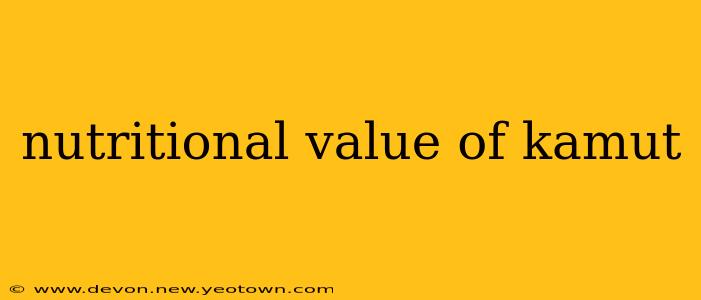Kamut, with its alluring golden hue and nutty flavor, is more than just a trendy grain; it's a nutritional powerhouse brimming with benefits. Often mistaken for a type of wheat, kamut (officially known as Triticum turgidum subsp. dicoccum) is actually an ancient grain, boasting a rich history and an impressive nutritional profile that sets it apart. Let's embark on a journey to explore the remarkable nutritional value of this ancient grain and uncover why it's gaining popularity among health-conscious individuals.
What Makes Kamut Nutritionally Superior?
Unlike modern wheat varieties, kamut boasts a higher concentration of several key nutrients. This ancient grain contains significantly more protein, fiber, and essential minerals compared to its modern counterparts. This richer nutritional profile stems from its genetic makeup and the traditional farming practices employed in its cultivation. Its hardy nature, resistant to many modern pests and diseases, often means it requires less pesticide and herbicide use.
Let's delve into the specifics:
-
Protein Powerhouse: Kamut provides a substantial amount of protein, crucial for building and repairing tissues, supporting immune function, and maintaining overall health. Its protein content surpasses that of many other grains.
-
Fiber Fortitude: Kamut is a fantastic source of fiber, both soluble and insoluble. This dual fiber punch aids in digestion, promotes gut health, and contributes to feelings of fullness, making it a great addition to a weight-management plan. Insoluble fiber adds bulk to stool, preventing constipation, while soluble fiber helps regulate blood sugar and cholesterol levels.
-
Mineral Marvel: This ancient grain is rich in essential minerals like selenium, zinc, and magnesium. Selenium acts as a potent antioxidant, protecting cells from damage. Zinc plays a vital role in immune function and wound healing. Magnesium is essential for muscle function, nerve transmission, and blood sugar control.
Is Kamut Gluten-Free? Addressing Common Questions
H2: Is Kamut Gluten-Free?
No, Kamut is not gluten-free. It contains gluten, a protein found in wheat, barley, and rye that can trigger adverse reactions in individuals with celiac disease or non-celiac gluten sensitivity. Those with gluten sensitivities should avoid kamut.
H2: How Does Kamut Compare to Wheat Nutritionally?
Kamut generally contains higher levels of protein, fiber, and certain minerals compared to modern wheat varieties. However, the exact nutritional content can vary based on factors like growing conditions and processing methods.
H2: What are the Potential Health Benefits of Kamut?
The rich nutritional profile of kamut is associated with several potential health benefits, including improved digestion, better blood sugar control, enhanced immune function, and potentially reduced risk of certain chronic diseases. However, more research is needed to solidify these claims.
H2: How Can I Incorporate Kamut into My Diet?
Kamut is incredibly versatile! You can enjoy it in various forms:
- Kamut Berries: These resemble large kernels of wheat berries and can be cooked like rice or quinoa.
- Kamut Flour: This can be used to bake bread, cakes, and other baked goods, offering a nutty flavor and a slightly chewier texture.
- Kamut Crackers and Cereals: These are readily available and offer a convenient way to include this grain into your diet.
The Final Word on Kamut's Nutritional Value
Kamut stands as a nutritional champion amongst ancient grains. Its rich protein content, high fiber levels, and abundance of essential minerals make it a valuable addition to a balanced diet. While not suitable for those with gluten sensitivities, for many, kamut offers a delicious and nutritious way to boost their overall health. However, it's always wise to consult with a healthcare professional or registered dietitian before making significant dietary changes, especially if you have underlying health conditions. Remember, a varied and balanced diet rich in whole grains, fruits, vegetables, and lean proteins is key to optimal health.

